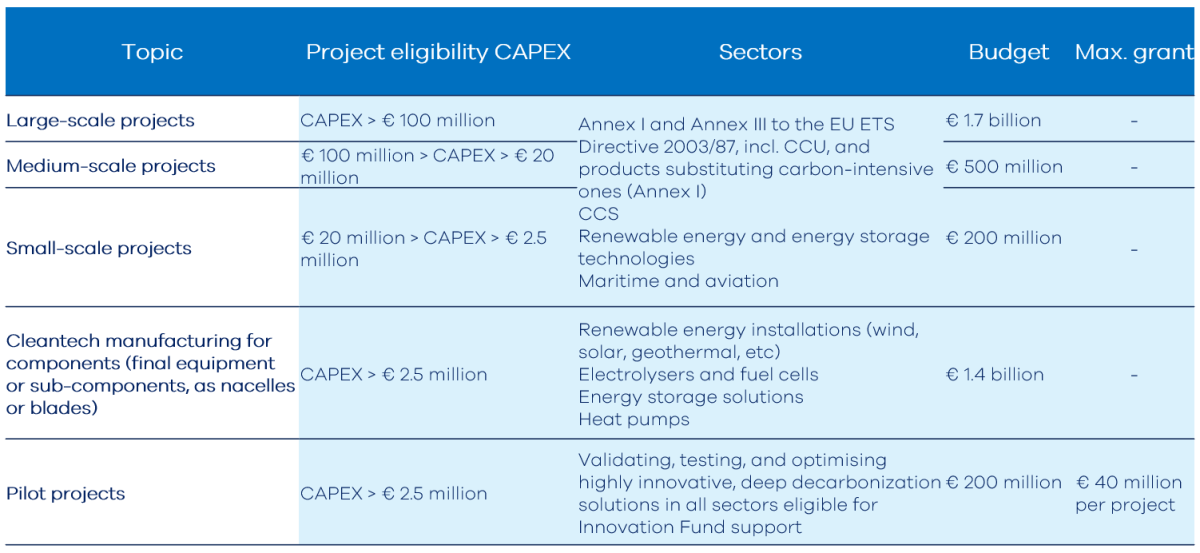Innovation Fund 2023
The European Comission has opened the Innovation Fund’s 2023 calls:
1. Innovation Fund auction | 2023 pilot auction to produce renewable H2
The Innovation Fund 2023 Auction will aim to support renewable hydrogen production.
A €800 million budget will be available for bidders (project developers). Bids can be placed until 8 February 2024.
Goal: support the new production capacity of renewable fuel of non-biological origin (RFNBO) 2 hydrogen within the European Economic Area.
Project size: new electrolyser capacity of a minimum of 5 MWe to be installed, which must be in a single location. Virtual pooling of capacity is not permitted.
Form of grant: The support will be provided in the form of a fixed premium in euros per kilogram of renewable hydrogen produced over a 10-year operational period, aiming to bridge the gap between production costs and market demand. The maximum offer cannot exceed €4.5 per kilogram (bid price), and the incentive cannot exceed €266.7 million at most.
The maximum level of support will be determined by the following formula:

Hydrogen production must adhere to new production capacity, verification, and certification in accordance with the Renewable Energy Directive (2018/2001/EU), Delegated Acts C(2023) 1086, and C(2023) 1087 final.
2. Innovation Fund call | Innovation Fund 2023 Net Zero Technologies
This call will offer up to €4 billion (+20% flexibility reserve, depending on the proposals’ quality) for projects in various sectors, depending on the topic:

Due to recent revision of the EU ETS Directive, the Innovation Fund calls are now also open to the maritime, road transport, and buildings sectors, in addition to technologies in energy-intensive industries (including aviation), renewable energy or energy storage.
The general large-scale, medium-scale or small-scale topics will support projects demonstrating highly innovative technologies, processes, business models or products and services, that are sufficiently mature and have a significant potential to reduce greenhouse gas emissions (GHG).
The cleantech manufacturing topic will contribute to build industrial capacity, technology leadership, and supply chain resilience within the EU. In fact, it will foster innovative manufacturing in cleantech for H2, renewable energy, and energy storage.
The pilots topic will support highly innovative, disruptive or breakthrough technologies in deep decarbonization in an operation environment.
The application window will be open until 9 April 2024 to legal entities established anywhere in the world with projects in the European Economic Area, and, in the case of electrical projects, in the Northern Ireland.
Projects will be assessed based on their potential to reduce greenhouse gas emissions, their degree of innovation, maturity, replicability, and cost efficiency. Bonuses will be delivert o net carbon removals, other GHG savings, commitment to use electricity from additional renewable sources or RFNBO hydrogen, and for maritime sector.
Significant changes related to the reduction of relative greenhouse gas emissions have been introduced, requiring now a minimum reduction of at least 50% (75% in the pilot projects). Regarding the cost efficiency ratio, the funding requested for each ton of CO2 avoided must be equal or less than 200 euros. This limit does not apply to pilot projects.
The selected projects can receive up to 60% of a project's relevant costs (net additional costs, calculated as the difference between the best estimate of economic costs (investment and operation) and economic revenues and operating benefits). A novelty is that those costs will default to the “without reference plant” method, although the “reference plant” method can also be applied.
Promising projects that are not sufficiently mature for a grant or not selected for funding due to budget limitations may benefit from the European Investment Bank's Project Development Assistance (PDA).
How can STREAM add value?
If you are looking for opportunities to fund your project, STREAM can provide:
- Compliance assessment of projects against requirements;
- Assistance with levelised cost calculation/analysis of H2 and strategic options for bidding price points; and
- Full support in project outlining, detailed viability analysis, and drafting the application, as described below:
- Elaboration phase: we gather and process all the client's information in order towrite a robust application within the stipulated deadline.
- Management phase: we follow up and manage the approved project, with the inherent requests for incentive payments and monitoring of indicators during the execution until the project closure. We also monitor the conditionalities of the approval decision.

